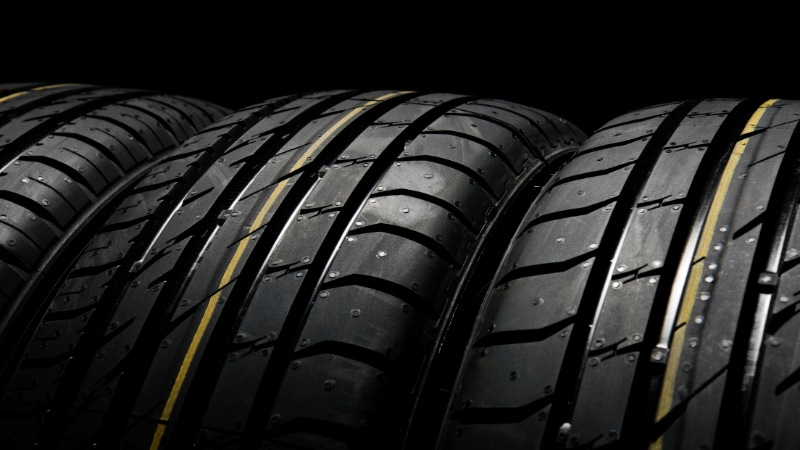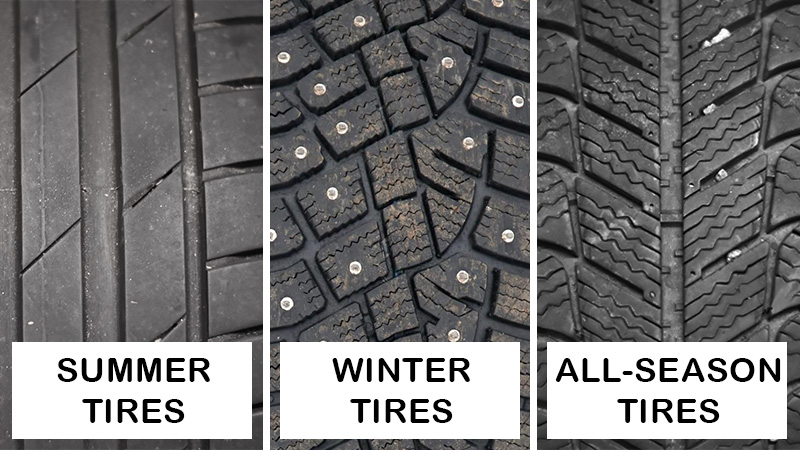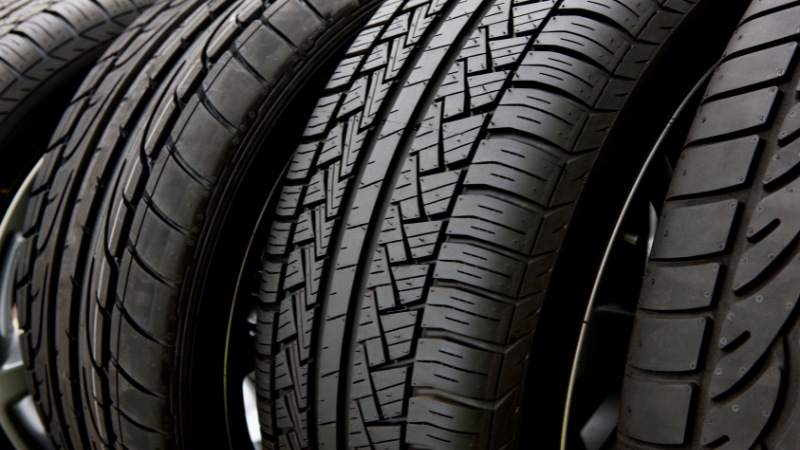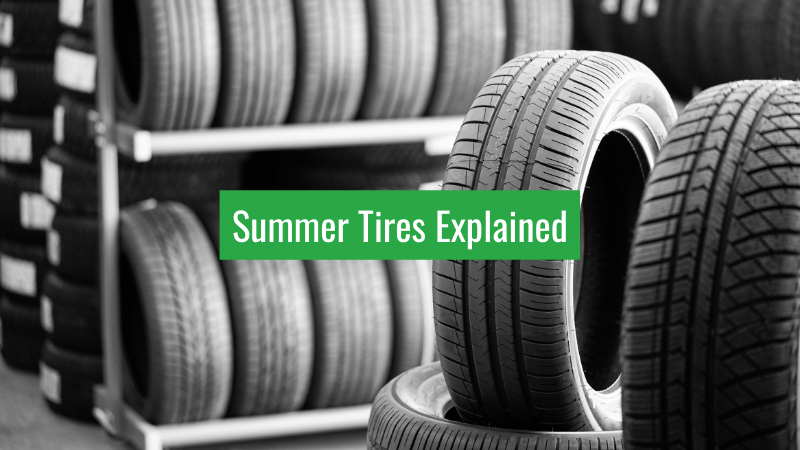When it comes to driving in warm weather conditions, it’s essential to equip your vehicle with the right type of tires.
Summer tires are specifically designed for use in warmer temperatures, providing optimal performance on dry and wet roads.
In this article, you’ll learn what summer tires are, when to use them, and why they’re important for enhancing your driving experience.
Summer tires are made from a harder compound than winter or all-season tires, allowing them to handle high temperatures and wear less in these conditions.
This specialized design ensures that you get the most grip on dry and wet surfaces, resulting in improved handling, better traction, and increased safety while driving in summer weather conditions.
It’s crucial to know when to switch to summer tires to get the best out of their performance capabilities. Generally, you should consider swapping your winter or all-season tires for summer ones when seasonal temperatures rise above 45°F.
By understanding the benefits and characteristics of summer tires, you can make informed decisions and enjoy a smoother, safer driving experience during the warmer months.
What Are Summer Tires?

Summer tires are specifically designed for optimal performance in warm weather conditions. They offer maximum traction and handling on both dry and wet roads, thanks to their unique rubber compounds and tread patterns.
In this section, we will discuss the rubber compound and tread pattern of summer tires, and why they excel in warm weather driving conditions.
Rubber Compound
The rubber compound of summer tires is different from that of all-season or winter tires. They are made from a softer rubber compound that can withstand high temperatures and provide excellent grip on hot roads.
This rubber compound is engineered to maintain flexibility, which delivers better traction and handling in warm conditions. Compared to all-season tires, summer tires have a distinct advantage in heat resistance and grip on dry and wet roads, particularly in performance driving situations or sports cars.
Capital One explains that the rubber compound in summer tires enables them to maintain grip on hot surfaces, which is essential for performance drivers and sports cars. When temperatures drop or conditions become icy, the rubber compound can become less pliable, reducing traction and overall performance.
Tread Pattern
Summer tires feature unique tread patterns that enable them to maintain traction on both dry and wet surfaces. Their large tread blocks are designed to maximize road contact, enhancing accelerating, cornering, and braking abilities.
The tread patterns also contain wide grooves that channel water away from the contact patch, significantly increasing grip in wet conditions. While summer tires offer a clear advantage on dry and wet roads, they are not suitable for use in cold or snowy conditions, as they lack the tread design necessary to grip ice and snow.
We Try Tires reiterates that summer tires are designed for warm weather conditions, and their specialized tread compounds and patterns make them the preferred choice for maximum grip and handling on dry and wet roads, but not in colder, icy conditions.
When choosing the right tire for your vehicle, it is crucial to consider the climate you will be driving in and the performance expectations you want. Summer tires are an excellent choice for drivers seeking optimal grip and handling in warm weather environments.
Benefits of Summer Tires

Summer tires offer several advantages over all-season tires, especially when it comes to performance in warmer temperatures. Some of the most significant benefits are:
Handling and Cornering
Summer tires provide excellent handling and cornering in both dry and wet conditions due to their specialized rubber compounds and tread design. These features allow for better grip and stability, allowing you to maintain control over your car in various weather conditions.
The grip these tires offer is essential for sports cars and high-performance vehicles that demand precise control and responsiveness on the road.
Braking and Acceleration
When it comes to braking and acceleration, summer tires shine. The rubber compound used in these tires is tailored for warmer temperatures, which allows the tire to maintain optimal contact with the road, leading to better control and handling during braking and acceleration.
This traction helps to reduce the risk of hydroplaning on wet roads and maximizes braking capabilities, ensuring your safety even in less-than-ideal conditions.
Wet and Dry Road Performance
Due to their unique tread design and rubber compounds, summer tires are built to perform in both wet and dry conditions. Wet roads can be a concern for drivers, but the tread design and circumferential grooves of summer tires help with water evacuation, reducing the risk of hydroplaning and improving road contact.
Similarly, summer tires perform exceptionally well on dry roads. With lower rolling resistance and minimized tread depth, these tires provide excellent road contact, enhancing your vehicle’s stability and control in dry conditions.
High-Performance Vehicles
If you own a sports car or high-performance vehicle, summer tires are the right choice for you. These tires are specifically designed to enhance the handling, cornering, and responsiveness that high-performance vehicles require.
The rubber compound used in summer tires can handle the heat generated by increased speed, ensuring that you maintain control and get the most out of your high-performance car.
Overall, summer tires offer various benefits for drivers, especially in warmer temperatures and when driving high-performance vehicles. When considering your next tire purchase, be sure to weigh these advantages and select the best tires for your specific needs and driving conditions.
When and Why to Use Summer Tires

Knowing when and why to use summer tires is crucial for getting the most out of your vehicle’s performance. Summer tires are specifically designed to deliver optimum performance in warm and wet conditions, making them ideal for use when temperatures consistently reach 45°F or higher.
Unlike winter tires, which are specifically designed for cold temperatures and icy or snowy conditions, summer tires are not built to handle those situations effectively.
Summer tires significantly improve your car’s handling, responsiveness, acceleration, braking, and cornering. This is due to their unique rubber compound and specialized tread patterns, which provide increased precision on the road and allow for better traction in wet conditions compared to all-season or winter tires. In fact, their sticky grip ensures optimal traction, making them the best option for wet roads.
Using summer tires instead of all-season or winter tires in warmer months can also help extend the life of your winter tires, as you are not putting unnecessary wear on them during months when they are not needed. Additionally, using the appropriate seasonal tires can improve your vehicle’s overall performance, fuel efficiency, and safety.
A few points to keep in mind when considering summer tires:
- Always ensure that you switch back to winter tires when temperatures drop below 45°F consistently, as summer tires will lose performance on cold surfaces and ice.
- Check your vehicle’s warranty, as some manufacturers may require the use of specific tire types or makes to maintain your warranty coverage.
- If your car has run-flat tires equipped, be sure to choose summer tires with the same run-flat capability to maintain your vehicle’s safety features.
Maintaining the right tire type for the season is essential for maximizing your vehicle’s performance, safety, and the lifespan of your tires. Be mindful of seasonal temperature changes and make the switch when appropriate to enjoy optimal driving conditions.
Comparing Summer, Winter, and All-Season Tires

Traction and Performance
When it comes to traction and performance, each type of tire has its strengths and weaknesses depending on the weather conditions. Summer tires are designed for high-performance vehicles, providing optimized dry and wet performance in warm weather.
They offer excellent grip, stability, and handling, enabling your vehicle to smoothly navigate turns and achieve shorter braking distances.
In contrast, winter tires are specifically designed to perform well in freezing temperatures, snow, and ice. They have deep tread depths, sipes, and specialized rubber compounds that remain flexible in extreme cold, helping your car maintain traction on slippery surfaces like snow and sleet-covered roads.
All-season tires are a versatile option that offers a balance of performance and traction in various weather conditions, including wet and dry pavement. While they may not excel in either extreme cold or warm weather, they provide adequate performance for most driving situations.
Durability and Longevity
Durability and longevity of tires also vary depending on their type. Summer tires typically have softer rubber compounds and shallow tread patterns, which can lead to faster wear in certain conditions.
Additionally, exposure to freezing temperatures can cause summer tires to harden and lose their grip on the pavement. It is important to switch to more suitable tires when winter arrives to maintain your vehicle’s performance and traction.
Winter tires have a specialized rubber compound that remains flexible in extremely cold temperatures, contributing to their overall durability in such conditions. Nevertheless, using winter tires in warmer weather can cause them to wear out quickly due to the softer rubber compound. It is advisable to switch back to summer or all-season tires once temperatures rise consistently above 40°F.
All-season tires are designed for year-round use and generally have a longer tread life compared to both summer and winter tires. Their rubber compounds and tread patterns are balanced to provide adequate performance and longevity in various weather conditions. However, for superior performance in specific conditions, using summer or winter tires may be necessary.
Considerations When Choosing Summer Tires
As you shop for summer tires, it is crucial to take several factors into consideration. This section will guide you through important aspects to keep in mind, including budget and warranty, brand and model, and size and compatibility.
Budget and Warranty
While choosing the right summer tires for your vehicle, budget plays a significant role. It’s essential to balance your budget with your needs for quality, performance, and safety. Since tire prices vary significantly, allocating a budget before you start shopping can help narrow down your options, making the decision easier.
Warranty is another important consideration. A good warranty can serve as a guarantee for the tire’s quality and longevity. Many reputable tire manufacturers offer warranties ranging from limited mileage to treadwear protection. Carefully read and understand the warranty details before making a purchase decision.
Brand and Model
Your choice of brand and model greatly influences your summer tire experience. Popular tire brands such as Michelin, Bridgestone, and Continental are known for their high-quality products. However, each brand may offer different models catering to specific vehicle types or driving conditions.
For example, the Michelin Pilot Sport 4S and Michelin Pilot Super Sport cater to sports cars and performance-oriented drivers, providing exceptional handling and grip.
It’s a good idea to research the tire dealer’s recommendations or read customer reviews to gain insights into the performance, durability, and reliability of specific tire models before making a purchase decision.
Size and Compatibility
Finding the right summer tire size and compatibility for your vehicle is essential for optimal performance and safety. Consult your owner’s manual or the placard on the driver’s side door jamb for the recommended tire measurements as the label specifies the ideal size, speed ratings, and load-carrying capacity for your car.
While choosing summer tires, it’s essential to keep in mind the type of vehicle you have. Whether you drive a sports car, sedan, or any other vehicle, the suitable tire choice should enhance your driving experience. Ensure that the tires you select are compatible with your car’s weight and performance requirements.
In summary, while choosing summer tires for your vehicle, consider your budget, warranty, preferred brand and model, and your car’s size and compatibility requirements. Carefully considering these factors will help you make the most informed decision and provide the best driving experience.
Additional Factors and Care Tips

Dealing with Snow and Ice
When considering the use of summer tires, it is essential to acknowledge their limitations in snow and ice conditions. Unlike winter tires or all-season tires, summer tires are not designed for cold weather and will perform poorly on snowy or icy roads.
It’s important to make a well-informed decision based on your driving habits and the local climate. If you frequently encounter snow or ice, consider using winter or all-season tires for better performance.
Fuel Economy and Rolling Resistance
Summer tires provide several advantages when it comes to fuel economy, including reduced rolling resistance. This is due to their lightweight construction and tread design that provide better contact with the road surface. By using summer tires, you can potentially increase your vehicle’s fuel efficiency, especially in warm weather conditions.
However, it’s important to remember that your driving habits also play a significant role in fuel economy, and maintaining proper tire pressure is crucial for achieving optimal performance. Check at least once a month, and make adjustments according to your vehicle’s recommended tire pressure.
Storing Winter Tires
Switching to summer tires implies that you need to store your winter tires properly for the warmer months. Proper storage is important to maintain the quality and longevity of your winter tires. Follow these guidelines when storing your winter tires:
- Thoroughly clean and dry the tires to remove dirt, brake dust, and road salt that can cause damage over time.
- Store tires in a cool, dry, and dark place, away from direct sunlight or extreme heat. Exposure to sunlight can cause rubber to degrade, leading to reduced performance and safety.
- Stack tires horizontally or hang them vertically to prevent distortion or damage to the sidewalls.
- Consider using airtight plastic bags and a vacuum-sealed system to minimize oxidation and prevent the tires from drying out.
By following these care tips, you can ensure that your winter tires are ready for use when the cold season returns.
Frequently Asked Questions
In this section, we will address some frequently asked questions about summer tires that haven’t been covered yet in the article. Each question will be presented as an H3 heading, followed by a brief and informative answer.
What temperature range is ideal for summer tires?
Summer tires are specifically designed to perform optimally in warm weather conditions. They perform best when temperatures are above 44°F (7°C), as the unique rubber compounds they are made of become more flexible and provide better grip and handling in these conditions.
If temperatures drop below this range, the performance of summer tires decreases, as their rubber compounds tend to stiffen up, resulting in less traction and grip.
Are summer tires safe to use in the rain?
Yes, summer tires are designed to provide good performance in wet conditions. They feature unique tread patterns that help channel water away from the contact patch, improving grip and reducing the risk of hydroplaning.
However, it is important to regularly check your tires for wear and ensure they maintain the appropriate tread depth to continue providing optimal performance in wet conditions.
Can I use summer tires all year round?
It is not recommended to use summer tires all year round, especially in areas with colder climates and snowy or icy conditions. These tires are not designed to perform well in temperatures below 44°F (7°C) or on snowy and icy roads.
In these conditions, it is advisable to switch to winter or all-season tires, which are specifically designed to provide better traction and handling in cold, snowy, and icy situations.
How often should I rotate my summer tires?
Regular rotation of your summer tires ensures even wear and prolongs their life. It is recommended to rotate your summer tires every 5,000 to 8,000 miles (8,000 to 13,000 km) or as specified by your vehicle’s owner manual. Rotating your tires also helps maintain consistent handling and performance.
Hi, my name is Niklas, the head content creator & CEO of Whirling Wheelz. I am very interested in vehicles of all kinds, mainly cars. I have a car mechanics degree from high school and a big hobby of mine is to follow the WRC (World Rally Championship) both online and through travel.

